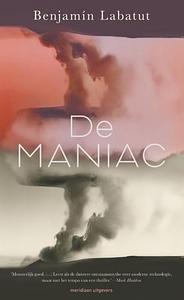Take a photo of a barcode or cover
A wonderful blend of fiction / non-fiction in three parts - super relevant right now and loved the meditation on madness and genius / reason
medium-paced
challenging
dark
emotional
informative
reflective
tense
medium-paced
Plot or Character Driven:
Character
Strong character development:
Complicated
Loveable characters:
Complicated
Diverse cast of characters:
No
Flaws of characters a main focus:
Yes
i like book a lot and it was very interesting but i liked other book more and hate AI so 4
Apologies to anyone who just added me and then I went silent for a month or two. Been trying to find another job and the market kinda sucks rn!
The MANIAC is definitely not the kinda story I'd usually read out of my own volition but man am I glad I did. Giving us Oppenheimer meets Queen's Gambit, this story goes through fictional accounts of several famous mathematicians and scientists of the 20th century (while predominantly focusing on detailing the life of von Neumann), later taking us to Go matches in 2016 South Korea, with champions facing the consequences of Neumann's twisted dreams in the form of AI.
The book's strength lies in making all the insanely complex mathematical ideas that were exciting to nerds back then exciting to us. Labatut's ability to break down the biggest issues and deliver us the relevant parts that made those issues important to history is fantastic. He writes each account in a slightly similar way, almost in a kinda Hollywood narration-y style that feels as if he's prepping the rights to be sold to a studio very soon. The gripping elements of the book and its skilled demonstration of why we should care for these dense concepts transcends the slightly similar tone and style of different historical voices, and ultimately make this a fun page-turner.
At times I think this book's trying to have its feminist cake and eat it, in that it wants to be quite explicit about how much of a boy's club the mathematical elite world was in the 20th century, but it also doesn't ever stray too far from ogling over how impressive their theories and inventions were and continue to be. It's definitely a step up from Oppenheimer in that the spouses feel more fleshed out and their brilliance is also somewhat showcased, but their chapters and accounts are ultimately focused on their husbands or male colleagues.
Honestly though, it's the last 70ish pages that make me confidently give this a 4 star rating. Throughout the book we go through a murder-suicide, a world war, the Manhattan project, the nuke being dropped and even the invention of the computer, but it's when the book turns into a board game sports drama that I was most excited to see what happened next. The tale of Lee Sedol is genuinely a phenomenal one and I feel like a full book about his matches (with a 40-50 page first act condensing the first two thirds of this book) would've been my ideal read. Not to say I didn't enjoy the book throughout, but I just really loved how it all boiled down to these decisive moments in both all of human history and one South Korean Go legend's life.
This book will make you eager to google Go and Chess matches as soon as you put it down.
The MANIAC is definitely not the kinda story I'd usually read out of my own volition but man am I glad I did. Giving us Oppenheimer meets Queen's Gambit, this story goes through fictional accounts of several famous mathematicians and scientists of the 20th century (while predominantly focusing on detailing the life of von Neumann), later taking us to Go matches in 2016 South Korea, with champions facing the consequences of Neumann's twisted dreams in the form of AI.
The book's strength lies in making all the insanely complex mathematical ideas that were exciting to nerds back then exciting to us. Labatut's ability to break down the biggest issues and deliver us the relevant parts that made those issues important to history is fantastic. He writes each account in a slightly similar way, almost in a kinda Hollywood narration-y style that feels as if he's prepping the rights to be sold to a studio very soon. The gripping elements of the book and its skilled demonstration of why we should care for these dense concepts transcends the slightly similar tone and style of different historical voices, and ultimately make this a fun page-turner.
At times I think this book's trying to have its feminist cake and eat it, in that it wants to be quite explicit about how much of a boy's club the mathematical elite world was in the 20th century, but it also doesn't ever stray too far from ogling over how impressive their theories and inventions were and continue to be. It's definitely a step up from Oppenheimer in that the spouses feel more fleshed out and their brilliance is also somewhat showcased, but their chapters and accounts are ultimately focused on their husbands or male colleagues.
Honestly though, it's the last 70ish pages that make me confidently give this a 4 star rating. Throughout the book we go through a murder-suicide, a world war, the Manhattan project, the nuke being dropped and even the invention of the computer, but it's when the book turns into a board game sports drama that I was most excited to see what happened next. The tale of Lee Sedol is genuinely a phenomenal one and I feel like a full book about his matches (with a 40-50 page first act condensing the first two thirds of this book) would've been my ideal read. Not to say I didn't enjoy the book throughout, but I just really loved how it all boiled down to these decisive moments in both all of human history and one South Korean Go legend's life.
This book will make you eager to google Go and Chess matches as soon as you put it down.
adventurous
challenging
funny
informative
inspiring
medium-paced
Plot or Character Driven:
A mix
dark
hopeful
inspiring
reflective
sad
slow-paced
Plot or Character Driven:
Character
Strong character development:
Yes
Loveable characters:
No
Diverse cast of characters:
Yes
Flaws of characters a main focus:
Yes
adventurous
challenging
dark
informative
reflective
medium-paced
Plot or Character Driven:
A mix
Strong character development:
Yes
Loveable characters:
Complicated
Diverse cast of characters:
Yes
Flaws of characters a main focus:
Yes
challenging
informative
inspiring
mysterious
reflective
fast-paced
Plot or Character Driven:
Character
Strong character development:
Complicated
Loveable characters:
Complicated
Diverse cast of characters:
No
Flaws of characters a main focus:
Yes
The history conveyed through this novel is fascinating, but as a novel it is incomplete and only sporadically successful.



